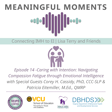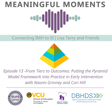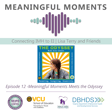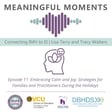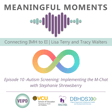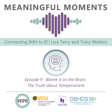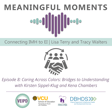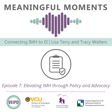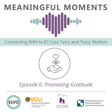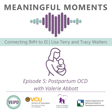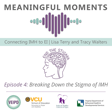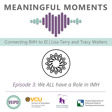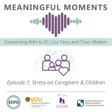Become a Creator today!Start creating today - Share your story with the world!
Start for free
00:00:00
00:00:01

Stress and the Early Interventionist
In this episode, Lisa and Tracy break down the various stress factors those working with young children and their families may face including the impact on practitioners and ways to reduce stress. Visit https://veipd.org/main/index.html or https://www.vaimh.org/ for more information.
Additional Resources discussed:
BOOK: What Happened To You? Conversations on Trauma, Resilience, and Healing by Bruce D. Perry and Oprah Winfrey
BOOK: The Anti-Anxiety Notebook: Cognitive Behavioral Therapy and Other Essentials by Hod Tamir, Rachel E. Brenner, Diana Hu, Emory Strickland, Haley Nahman
Transcript
Introduction and Roles
00:00:10
Speaker
Welcome everyone to Meaningful Moments Connecting Infant Mental Health to Early Intervention. My name is Lisa Terry. I am an Early Intervention Professional Development Consultant with VCU at the Partnership for People with Disabilities. I am also endorsed as an Infant Family Specialist and I am the Division of Early Childhood Infant Mental Health
00:00:33
Speaker
community of practice co-facilitator as well. And I'm so excited to be here with you today for episode two. I'm gonna go ahead and let my co-host introduce herself. Tracy, go ahead. Yeah, thanks, Lisa. Good morning, everybody. It's so good to be with you guys for our second episode. My name is Tracy Walters, and I'm the state coordinator for infant and early childhood mental health.
00:00:56
Speaker
And I am seated at the Department of Behavioral Health and Developmental Services. I am also endorsed as an infant family specialist and oversee all things infant and early childhood mental health across the state. So I get to work with many of you. And I'm so excited to be here with Lisa, my partner in crime, to talk about all things infant and early childhood mental health today.
00:01:18
Speaker
Yes, thank you all. Before we get started, we are going to let you know that this podcast is a collaborative effort from the Virginia Department of Behavioral Health and Developmental Services through a contract with the Partnership for People with Disabilities at Virginia Commonwealth University. And what do we have in store
Focus on Practitioner Stress
00:01:37
Speaker
today? We are going to talk about stress and the practitioner. Last
00:01:42
Speaker
episode, we talked about stress and families and how that impacts them. And now we're really going to focus on the people that are working with these families. So Tracy, you want to go ahead and get us started? Yeah, Lisa is such an important topic. And you're right. Last time we centered our conversation around families and their stress and children and their stress and what that looks like today. We're really going to be talking about those touch points with our practitioners and what their stress looks like.
00:02:12
Speaker
So in honor of that, I want us just to get ourselves grounded for today, right?
Breathing Exercise Introduction
00:02:20
Speaker
We have this little bit of time that we can carve out together. I think it's so important to be mindful of that because it's not always so achievable for us as professionals. So we're just going to do a little breathing exercise. So whether you are doing dishes right now or you are folding your laundry, walking your dog,
00:02:43
Speaker
These are all things that you can do. If you're in a seated position, you can close your eyes as well. If you can just relax into it, that would be wonderful. But we're going to start by grounding ourselves just with a simple breathing exercise. We'll do two quick cycles of this. So we're going to start by closing your eyes if you can. We're going to take in four deep breaths. One, two, three,
00:03:13
Speaker
And four. And seven out. One. Two. Three. Four. Five. Six. Seven. And one more. In for one. Two. Three. Four. Out
Benefits of Deep Breathing
00:03:41
Speaker
for seven.
00:03:43
Speaker
One, two, three, four, five, six, and seven. And come back, come back to where you are. Hopefully that helps just kind of restore that oxygen in our brain, slow our heart down a little bit. I'll tell you something interesting, Lisa,
00:04:11
Speaker
Many years ago I was at a conference and somebody was saying taking seven deep breaths in and out will just lower your blood pressure automatically. And I thought that was fascinating. And so someone like myself who can get really ramped up in a moment because this is something we'll talk about today, like we're always trying to hit like doing our best work, right? And how much we hold in ourselves when we are trying to do that.
00:04:41
Speaker
it really is helpful to use these simple exercises. And it's something we can do every day. Am I right? Yeah, Tracy. And it's so funny because I'm like, I can't even breathe out for seven seconds when I'm doing it. But I'm like, I'm doing the best I can. And that's what I have. And that's okay, too. Absolutely. I mean, I think that's true, right? And I think it's like any breathing exercises or any mindful exercise. It's just that it's like building a strategy for ourselves. And it's building tools and
00:05:11
Speaker
You're right. When I do it sometimes I'm like, at the end. So hopefully nobody passed out on us and you're still with us for another episode. But yeah, I'm just going to go ahead and get started then Lisa so we can just dive right in. And hopefully I won't get us too ramped back up. We'll have to do a pulse check later when we're talking about our stress. But last time we did center on conversation about
00:05:39
Speaker
stress and families and children that we're working with. And that's really important. But what's equally important is our own stress that we are bringing into the workplace because we are setting the tone for what is happening with the children and families that we're working with. And so I think that's really, you know, really important that we consider this as we go into every day.
Managing Practitioner Stress
00:06:05
Speaker
And I think we all know firsthand what it's like
00:06:09
Speaker
When we push into our professional world, we're balancing a lot of roles. You and I are here today shooting this podcast out, but we're also mothers, grandmothers, professionals, wives, daughters. We're all the things. And so a lot of times, these are competing roles. And I think that we talk a lot about trying to keep our spaces very intentional, but we know we carry all those pieces with us.
00:06:36
Speaker
And so all of our early interventionists and our infant mental health professionals are doing the same thing. So they're carrying all those pieces with them. And then we have those as professionals, those other responsibilities of work. And this is one of the things we're really going to be focusing on today is the things that we did and get into the field for, paperwork, you know, sometimes stressful relationships with colleagues or just, you know, just very busy relationships with colleagues.
00:07:05
Speaker
The use of our mobile office, many of us have like had to go through many transitions, like we're working out of our cars as early interventionists, we're working out of our houses, our closets, all kinds of places have also been impacted by the pandemic, right? So all of these things are really important to unpack as well when we're talking about stress. Because all of those things are really critical in looking at our mental health, but also our physical health.
Mind-Body Connection
00:07:31
Speaker
And if you read any of Gabor Mate's work,
00:07:35
Speaker
And, you know, we can reference him later. He talks all about the body, mind, connection, and we cannot separate the two, right? So that physical and mental piece really has to be looked at.
00:07:49
Speaker
I don't know, Lisa, what do you think about that? Do you buy into that process? Yeah, I mean, it's just so crucial, I think, because I know that we've all had these moments. We're about to walk into a home visit, right, to see a family and provide them that support. And we might not be grounded yet, right? We might not have full control over our thought processes, because we're so stressed.
00:08:14
Speaker
And we're still thinking about what might have happened 15 minutes before like say on the drive to that house and there's a detour and you just kind of start to get really frazzled because you have to figure out how to get to this family's house around this detour. And you're coming in, you're running a few minutes late now. And you're just not
00:08:36
Speaker
feeling 100% where you can really use your full capacity because the stress is impacting all of that. Your heart's elevated, like you said, right? And your blood pressure might be a little bit higher. And so we have to really make sure that we understand how important it is for us to ground ourselves and regulate ourselves before we enter that home and knock on that door.
00:09:02
Speaker
Yeah, you're exactly right about that. And I think one of the tools we can really use, and this is something that has been talked a lot about in both early intervention and in early childhood classrooms, also in infant and early childhood mental health, is this idea of a self-check.
Self-Check Strategy
00:09:20
Speaker
Now, this is a simple strategy and it's a simple tool that goes along with one of the points we really want to discuss today, which is just like creating time and space for yourself as a practitioner, right? This slowing down process. You're exactly right. How much do we talk about co-regulation?
00:09:41
Speaker
in these spaces where we're talking about children five and under, right? So much of the time. So in order to do that for a child and a family, we have to regulate ourselves. So this idea of a self-check is something very simple that you can do. I know that we have talked about a child's invisible backpack before.
00:10:03
Speaker
and just thinking about what the child might carry into a classroom space with them or what they're carrying when you go into the home for a home visit, right, or your early intervention service delivery. This is the same thing only we're checking our own invisible backpack. So when you pull up to that home or whatever space that you're working in, right, we want to sit there and say, where am I with myself right now? What is happening in my head?
00:10:32
Speaker
How am I feeling? What am I bringing into this space so that we can push into that space, prepare to work with that family? Right, Lisa? Right, because it really is going to impact that family, whether we realize it or not, it's going to impact our interactions.
00:10:48
Speaker
And it's so funny, my husband's going to kill me for even saying this, but he works at a really highly stressful job. So he works in a prison. And when he first started years ago, I told him I was like, you have to figure out a better way to kind of unpack all of that before you come home, because you're bringing it into the household. And it's really affecting everyone. And so you start to see this like little ripple effect.
00:11:13
Speaker
But it was something I
Stress Management in Personal Life
00:11:14
Speaker
noticed. And so he really had to work hard on regulating himself before he gets home. And the way he does that is he listens to music, and it kind of helps him kind of decompress a little bit. But that's why it's so important, because we don't want to unintentionally bring our stress into these families' homes. And then these families can start to feel a little bit more stressed. And so it can really impact all of those interactions. You can unintentionally release some
00:11:42
Speaker
send your stress to the caregiver who can unintentionally give it to the child and so it's very important that we regulate. Yeah, I think you're right about that and you know here's one of the things I always talked about with a lot of topics with teachers for many years
00:11:58
Speaker
And that was, you know, you may be the first stone, right, to cause that ripple in a pond. And that thought can really be on a positive note, but it can also be on a negative note, right? That impact is what I think you're speaking to, Lisa. And one of the things that I learned about the pandemic and thinking about is self-check.
00:12:18
Speaker
For practitioners was this idea of remember how all the medical professionals like after they left work They would go home and they would strip everything off Right and they would shower and they get themselves refreshed before they went into their own homes, right? mentally, it's kind of what we are promoting here today is really do that mental stripping of like This is where I am right now and being present
00:12:47
Speaker
being present in the moment for what you need to move into with this next child or the next family because you're exactly right. You just left one family or maybe you left a stressful situation with a colleague or what have you or you didn't get to finish some documentation, right, that you needed to get finished. So we want to make sure that we are stripping that away, doing the self-check. You can even put your hand to your chest, slow that heartbeat, right,
00:13:15
Speaker
Feel yourself being in the moment and saying, I'm ready. Give yourself some kind of acknowledgement. I'm ready to move into this appointment.
00:13:23
Speaker
Do you think that is something that might work?
Self-Awareness and Professional Relationships
00:13:27
Speaker
Yeah, absolutely Tracy. And you know, this is one of the things that I love so much about infant mental health because it really calls for self-awareness, right? Self-awareness of how we're feeling and really being reflective in that. And so I think, you know, the key to that is to really be intentional about being aware of how your mind and body are feeling at all times because it will
00:13:51
Speaker
Impact those relationships when you're trying thinking about building a rapport with the family and establishing a connection in a relationship right we have to be active listeners which is very hard to do if we aren't self aware of where we're feeling how we're feeling right now and how that's impacting our body and our mind right.
00:14:12
Speaker
Yeah, and I think that distraction can be a real enemy for us, right, in our work. So, and in our lives in general, right. And just think about how many things like compete for our attention when we're working or when we're trying to build those strong relationships and attachments with these children and families to really promote the skills that we need promoted for child and family while minimizing our own stress. And I think this,
00:14:40
Speaker
this intentionality that you're speaking of. One of the things we talk about a lot in infant mental health is our way of being. So when we think about this work, it's beyond like what we studied in graduate school or what we learned from a textbook. It's who you are, who you bring yourself to be in this work is as important as what you know. And so that way of being and that way of being intentional
00:15:09
Speaker
is so critical with children and families. So with that in mind, I'm going to like kind of start shooting into a breakdown of some of this, some of the pieces that I think we need to be mindful of. And I think this has been forever in the early intervention and infant mental health world.
00:15:26
Speaker
But I think the pandemic again has kind of highlighted some of the stressors and some of these key points for us to keep in mind. So we talked a little bit about that creating that intentional time and space to minimize your stress and do that self check so that you make sure you're regulated so that when you go in, you're helping to regulate, attach and build those relationships to really put in those founding pieces of that healthy promotion of
00:15:56
Speaker
mental health for young children and all things skill building. The other thing that I think has really come up for a lot of people is this idea of we were essential personnel.
00:16:11
Speaker
So in early intervention and infant mental health, all
Early Intervention and Trust Building
00:16:15
Speaker
the practitioners were really, it was really essential, right, that we were still doing the work that we were doing with children and families. It's not like a piece of paper that could be stacked in like those little stacking files on your desk. It's like, oh, I can get to that tomorrow.
00:16:29
Speaker
No, you've got mom and a child or a couple of children and a dad that you're really trying to work with, right? And so you have to keep that consistency in play. You have to keep that momentum in play because we know trust in relationships takes consistency, it takes time, and it takes showing up.
00:16:49
Speaker
We can't just do a one and done with a family. We have to get in there. We have to really start being mindful of who are these folks that I'm working with? What are their needs? And really following their lead and observing them to understand what roles we can best play for them, right?
00:17:07
Speaker
to support them. Yeah, Lisa, what do you think about that? You know, I was just going to say that I think sometimes one of the hidden stress factors that we face because you're right, you know, we did look at ourselves as essential right before.
00:17:22
Speaker
And I think sometimes what can happen when we're supporting families, we can feel defeated. Like maybe we're not doing enough. We start second-guessing ourselves, right? And we're not really giving ourselves as much grace because when we're supporting families, it is hard work and you're just along the journey with them, right? But I think a stress that you can feel is when you're like, I am not sure that I am doing enough for this family to support them.
00:17:51
Speaker
And so you have to really dig in deeper to figure out why is it you're feeling that? Is it because you're just not giving yourself grace? Because a lot of times what you'll find is that a lot of early interventionists, they're doing great work, right? And they're there and they're present and they're supporting that family and really addressing those outcomes and those goals. But it could just be that they're not giving themselves grace because sometimes we like to see what progress, right? We want to see the end result right away.
00:18:20
Speaker
it's not going to always happen like that because each individual family is so different and there's so many different factors. What do you think about that, Tracy? No, I think you're right. And I think that we could take this all the way back to like what kind of personalities and temperaments are attracted to the work that we're talking about right now, right? We want to save the world, am I right, Lisa? It's like every child you see on the street, we're wondering about that child, we're wondering about that family.
00:18:45
Speaker
So I think that's exactly right. And I think we do put a lot of pressure on ourselves. We do want to see children succeed and we want to see families with healthy attachment to these children because we know what the trajectory will be if we can be successful with that. But, you know, early intervention and infant mental health folks, there's a whole lot we're trying to check off in these visits, right? We have all these developmental goals. We have family goals that we're looking at.
00:19:13
Speaker
And so we're trying to accomplish a lot. What I think is really important, though, is we need to move away from this idea of perfectionism. And I think we need to lean a little more into the good enough space. And when I say good enough, I'm not really saying, hey, like, just leave it to abandonment, you know.
00:19:35
Speaker
I'm really talking about we always go in to do our best work, but I think we have to accept the fact to that, hey, some days we are showing up and this is the best and this is the most that we have to offer. And also we have to remember, Lisa, this is not like a scripted process for families. Working with children and families is a journey. And so we don't know what's going to pop up for them or ourselves on a day-to-day basis. So we really need to be along for the ride
00:20:05
Speaker
We have to keep the work fluid and meaningful. And I think that, again, just ties back to that piece of really being intentional, being mindful and checking ourselves. It's very interesting to me. I feel like a lot of people in early intervention
00:20:24
Speaker
infant mental health, really an education in general. From my mind's eye, what I see a lot is we feel like we need to attend strictly to a lot of what is happening to them. And yes, that is our professional role, but this has to be bilateral. We cannot just attend to what is happening for that family and child in the process because it's a very reciprocal process. You know, when we talk about parallel process and infant mental health, we're also looking at like ourselves in this work.
00:20:54
Speaker
and what we're bringing to it. And I think this is a critical thing for us to remember. And that getting back to that like essential personnel, there was a lot of controversy there, right? Because we were trying to figure out how to maintain all of these quality pieces that you're mentioning, while also trying to determine
00:21:13
Speaker
How are we going to capture and still engage, capture these relationships, engage in these relationships in the same way we always have when our strategies, tools, and stressors look different? So that's one of the things I think that has really been happening on the face of the stress for the practitioner.
Career Disengagement and Burnout
00:21:32
Speaker
The other thing is career disengagement or dissatisfaction. You know, we've been talking a lot the last couple of years about early intervention,
00:21:43
Speaker
and education in general with recruitment and retention of professionals. And I think it's really important for us to look at this stress piece because I think that is one of the things that we're facing. I think we're facing burnout. And I think that some of our most wonderful practitioners are
00:22:03
Speaker
switching up roles. They're feeling a little burned out. They're feeling a little stressed and thinking of ways that we can support these kind of dialogues so that we don't get to that point, I think is important. And I know as a professional development person, Lisa, you hear this all the time. Do you have any thoughts about that?
00:22:22
Speaker
right Tracy. I mean, honestly, I feel like most people that work at an early intervention, they love their job. They love working with families. But what you said before, it's that documentation piece. No, it's never fun, right? But it is still an essential part of our job. Because that's really what justifies the services that we are providing, right? That's our our payer. That's how we get paid. And so that's really the
00:22:49
Speaker
most important piece for us to be able to continue to do this work. And so yes, it's never fun. But I think you know, people have to find their own groove, they have to figure out like what really works for them, how to really maintain that organization and stay on top of it.
00:23:05
Speaker
I think what happens sometimes is the paperwork starts to build up. And like for me, we talked about this in the first episode, but I know like, when I feel stressed, I start to like shut down and I'll avoid the task, right? So when the paperwork starts piling up, then you just don't even want to do it. And so I remember when I first started an early intervention, my
00:23:28
Speaker
colleague who shared an office with me, she said, write a list down, do one thing at a time and start marking it off. So that way you can start to see the progress that you're making. And it really did kind of help alleviate some of that stress. Yeah, I think you're right about that. And it's so funny, like I do think it's important. Lisa, for all of us just to take a moment and say what I'm stressed, how does that show up in my body?
00:23:53
Speaker
And one of the things I really wanted to hit on, too, is that psychological stress.
Physical Manifestations of Stress
00:23:57
Speaker
Like, we've kind of talked about the occupational stress and what that looks like, but really thinking about how that shows up in your body. So, you know, when you shut down, you know, like you're talking about, I'm a spinner. So, I'm looking at, oh, my gosh, which folder did I put that in? Like, I know I have that document somewhere, you know?
00:24:15
Speaker
And I think that we have to be very realistic about what our strengths are and areas that we need to work in. And I always say, like, think about the worst case scenario of what could happen and then, like, just, you know, talk to the universe about letting the best positive outcomes be. But be prepared for those days when things aren't working well for you, right? Because that will help you cope with the stress in that moment. But one of the things, you know, that I really want to touch on, too, is that psychological stress.
00:24:42
Speaker
And like how we're dealing with the demands that are put on us, because I do think that's really important. And I think just some of the strategies you're talking about, about making a list, you know, you can do a to-do list. You can record yourselves. I have been known to record myself and say, tomorrow I need to do blah, blah, blah.
00:25:00
Speaker
That was an old trick I learned working for VCU Health Systems. I would see the docs do that and I thought, brilliant. That is brilliant. So that works. It also helps with that anxiety that goes along with stress sometimes and anxiety and stress are slightly different.
00:25:16
Speaker
But that anxiety of feeling worried or nervous or uneasy about an upcoming event or something that may be of certain, uncertain outcomes that you need to get through. So really thinking about that anxiety and what it looks like for you and then how you can do it. So when I'm spinning around saying I know I have that document,
00:25:38
Speaker
or let me confirm this time again with someone. That's when I'm like, I just need to make sure my ducks are in a row. And it really does help me to take that breath. So I make sure I'm doing the right thing, not just for myself, but for everybody that I'm working with. And then one of the other things that we really need to be aware of is this idea of secondary trauma, right, or vicarious trauma.
Vicarious Trauma and Triggers
00:26:01
Speaker
And this is something that we do talk a lot about, Lisa, as you know, in infant and early childhood mental health.
00:26:08
Speaker
I think it's something that we need to be talking more about in early intervention overall for practitioners. But just looking at that, it's a natural but disruptive byproduct of working with other families, right, based on what traumas they may have had or experiences. Because when we walk into that space and we're working with them, we're going to be absorbing that. Have you ever experienced that, Lisa? Any thoughts to share on that?
00:26:35
Speaker
Yeah, Tracy, this is so important because I think we need to understand what our triggers are and what happens and what is our plan when we feel triggered, right? Because we are going to meet families and they are going to have stories that might trigger something that's happened to us personally, right? And I will share like a very personal story. So I had a family before
00:27:00
Speaker
that told me that they had a miscarriage and I had a miscarriage a little bit before that and so that was a huge trigger for me and so I really needed to make sure that I was going to talk to somebody about that afterwards and really kind of just digest and process through it because that's something that can come up and that's something that's really hard to
00:27:22
Speaker
just to kind of go through and you don't want to hold it all in, right? Because when you hold it all in, it's just going to create more stress in your body that then needs to be there, right? Yeah, and I'll tell you.
00:27:34
Speaker
I think we've all had these experiences and sometimes, you know, if any of you guys have read What Happened to You by Dr. Bruce Perry, you know, you're going to, this is very, going to be familiar to you. If you haven't read it, we'll try to stick it in some show notes for you guys because that is an important piece of literature, I think, for anyone working with children and families. Not only that, but for ourselves as human beings.
00:27:59
Speaker
But one of the things that we need to think about that he kind of brings up in the work too is thinking about those triggers that you're talking about, Lisa, but also just processing like, wow, sometimes these things come up really unexpectedly.
00:28:15
Speaker
And, you know, maybe you haven't thought about an incident or an event or a situation that happened to you for years, and then it comes up. So, it's important to recognize it, acknowledge it, so that it doesn't get in the way of those relationships. A friend of mine, dear friend, shout out to Kristin, sent me a, this, I had spotted this journal on Amazon, and it's a cognitive behavioral, like writing journal.
00:28:43
Speaker
so that it helps kind of correct those kind of things. Like if you get a negative pattern going on in your head, you can write about the incident and kind of outlines and let you put it on paper.
00:28:54
Speaker
Highly recommend, we'll try to put that link in there as well because this is a great tool and I've used it a lot and it really does help with those negative patterns but it would also help with those triggers that come up. Do you use any tools like that Lisa or anything else come to mind? Yeah well the other thing I was going to say Tracy is too because we talked about the ghost in the nursery before and I think another trigger that we can have is actually somebody's
00:29:19
Speaker
parenting style, because we are going into these homes. And so we're observing all these parenting behaviors. But a parent could have style or behavior that might trigger you to how you were raised, right? It might take you a little bit back. And so that's another trigger that I think that we should make sure that we're being aware of as well.
00:29:40
Speaker
Absolutely. I mean, I think that if we don't recognize and acknowledge those things as they're happening for us, or even kind of anticipating something that might come up for us is a good strategy, right? It can get in the way. And then we're going to have to really process that before we get into that next setting with the next family, or if we come back to that family and we had some difficulty. And I think that some of that is what we're talking about when we're talking about
00:30:10
Speaker
creating that balance between the me and us, between that professional boundary and that self-care because although there's some separation, there's also that huge integration,
Telework Stress in Early Intervention
00:30:22
Speaker
right? One is going to impact the other.
00:30:25
Speaker
So the other thing I really want to touch on is this telework as a tool. I think some folks are still feeling stressed about like how engaged am I feeling about that? Am I making the same impact? Some systems and some localities are still working with like, you know, teleworking.
00:30:42
Speaker
with families, I think it has broadened what we're able to achieve as professionals. It's really strengthened our reach when localities have fewer resources. And I'm thinking about a lot of the rural areas that we work with who just do not have as many practitioners around, right? So it's beautiful in that respect. But I think as professionals, because it's a different way to do it, we're still kind of wondering about that.
00:31:08
Speaker
Yeah, Tracy, I think that anytime there's anything new that we're not comfortable with and that we haven't practiced a lot, we don't have as much experience about it can create an unintentional stressor. And so it's really, those are the times where we have to understand that it is really something that we have to deal with and we have to figure out a way to overcome that, right? Because it's our, it's a us issue.
00:31:31
Speaker
It's not really something that you know, because like you said, there's so many benefits to it, right? And so we have to figure out how can I overcome this? How can I get better? How can I be more proficient at it too, right? And so I wanted to make sure that we are going to have time to go through these strategies to to support yourself. And Tracy, you started off
00:31:52
Speaker
beautifully with just modeling how to do some deep breathing exercises for us. We have talked about journaling, right to and just reflecting on your day. I talked about like how even my husband listens to like music to help calm himself like that's something that I even enjoy, especially like I hate cleaning. But when I want to clean if I turn on music, I am motivated and I am ready to do it. And I'm a lot less stressed about having to do it, right?
00:32:21
Speaker
I know I've worked with families to about, you know, people love going to like the spa. Is it always affordable? Do you always have the time to do it? Probably not. So trying to even create something like that for yourself at home, right? Whether you're doing those great little they have all these masks now that you can buy and just put some classical soothing music on and just create your own spa day at home, but you just have to be intentional about really taking care of yourself.
00:32:50
Speaker
Yeah, I mean, those are great strategies. And I think the other thing is, you know, we used to talk about this a lot when, when your children are smaller, you know, they say read for 20 minutes a day with your child. I really have interpreted that too. It's like, we've got to carve out at least 20 minutes for ourself. I don't care what it is that you're doing, but not in any of your other roles where you're serving family and a professional role, just serve yourself.
00:33:16
Speaker
for 20 minutes, if that means eating a popsicle, if that means taking a walk, do that. The other thing is be mindful of your attitude and your thought patterns. When we start getting stressed, we can get really a negative narrative. When you start seeing that inner self-talk turn to that more negative piece, you need to take some time out. And then here's the one that's really hard for, I think, folks in our line of work, saying no.
00:33:43
Speaker
Set the boundaries. Listen, I'm in my mid 50s and I'm still trying to figure this out to just say, you know, I can't do that right now. I'm just claiming it as a generational thing and and I'm moving through it. But but that's still hard. And then set boundaries and leave it at work.
00:34:00
Speaker
You know, if you can at all turn yourself off at whatever your skip, you know, your shift is five o'clock, six o'clock, three o'clock, whatever it is, try not to go back in. This goes back with that good enough. Shut the door on that day and said, I did what I could for the children and families of Virginia today. And I have to restore myself for tomorrow. Do you?
00:34:23
Speaker
kind of go with that thought. Yeah, I mean, honestly, and it's so funny, because I am probably like the worst person at self care. But really, what it is, is just finding something that makes you feel good, right? What is it that makes you feel good, whether it's exercise, whether it's spending time with your family, spending time with your friends, going and doing things or, you know, journaling or whatever it is that really just makes you perk up.
00:34:48
Speaker
and feel like more of a positive person, like you said, you know, getting all that negativity out. And so just understanding what makes you feel good. Write a list down. Write a list down of what makes you feel good, what are some good self-care strategies for you, whether it's taking a walk, and you have that as your go-to. So when you start feeling stressed, you're like, okay, I know I can go and do this right now. And another piece I think is really important is reflective supervision.
00:35:16
Speaker
And that is really going to help because you need somebody to help kind of help you process through what you're feeling.
Reflective Supervision Importance
00:35:25
Speaker
Oh, my gosh, great minds think alike. As you know, in Virginia, we've been doing a huge push to really create funding for reflective supervision. It really makes the difference in the work that you're doing with children and families, whether you're in early intervention or infant mental health is your background.
00:35:43
Speaker
We are really, really putting a lot of effort into that. You've got to process your work and your feelings behind the work. But really, I want to wrap up on the last strategy that I think is really important. And that is nothing without joy, Lisa.
Maintaining Joy in Work
00:36:00
Speaker
Nothing without joy. And I think when we lose our joy in the work, which that can happen if we let these stressors push in and take over,
00:36:11
Speaker
we can lose ourselves. So nothing without joy, guys. Really be mindful of what your needs are as you're meeting the needs for children and families across the state. You have to take good care of you.
00:36:26
Speaker
Absolutely, Tracy. Yes. So we are going to leave you with that figure out ways to take care of yourself. Don't forget how valuable you are, especially in the work that you're doing when you are supporting children and families. So that is today's episode of meaningful moments. Thank you all for listening in and join us next time. And we are actually going to talk about
00:36:53
Speaker
everybody's role in supporting the emotional well-being of all families because we all play a role in doing that. And so we're going to actually really break down the skills and the strategies in order to do that. So stay tuned for that.
Subscription Encouragement and Resources
00:37:08
Speaker
Make sure that you are subscribed on iTunes, Spotify, and Google podcasts.
00:37:14
Speaker
Give us five stars if you liked today's episode. And for more information, be sure to visit VEIPD's website for resources, tools, and archived webinars. You can also visit VAME for additional resources. Thank you all so much and have a great day.
